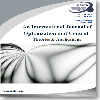Economic production quantity (EPQ) model for three type imperfect items with rework and learning in setup
Economic production quantity (EPQ) model for three type imperfect items with rework and learning in setup
___
- [1] Rosenblatt, M.J. and Lee, H.L., Economic production cycles with imperfect production processes. IIE Transactions, 18(1), 48–55, (1986).
- [2] Schwaller, R.L., EOQ under inspection costs. Production and Inventory Management Journal, 29, 22–24, (1988).
- [3] Zhang, X. and Gerchak, Y., Joint lot sizing and inspection policy in an EOQ model with random yield. IIE Transactions, 22(1), 398– 401, (1990).
- [4] Salameh, M.K. and Jaber, M.Y., Economic production quantity model for items with imperfect quality. International Journal of Production Economics, 64(1), 59–64, (2000).
- [5] Goyal, S.K. and Cardenas-Barron, L.E., Note on: economic production quantity model for items with imperfect quality a practical approach. International Journal of Production Economics, 77(1), 85–87, (2002).
- [6] Ouyang, L-Y., Chen, C-K. and Chang, H-C., Quality improvement, setup cost and leadtime reductions in lot size reorder point models with an imperfect production process. Computers and Operations Research, 29(12), 1701–1717, (2002).
- [7] Papachristos, S. and Konstantaras, I., Economic ordering quantity models for items with imperfect quality. International Journal of Production Economics, 100, 148–54, (2006).
- [8] Jaber, M.Y., Lot sizing for imperfect production process with quality corrective interruptions and improvements, and reduction in setups. Computers and Industrial Engineering, 51(4), 781–790, (2006).
- [9] Wee, H.M., Yu, J. and Chen, M.C., Optimal inventory model for items with imperfect quality and shortage backordering. Omega, 35, 7–11, ( 2007).
- [10] Maddaha, B. and Jaber, M.Y., Economic order quantity for items with imperfect quality: Revisited. International Journal of Production Economics, 112 , 808–815, (2008).
- [11] Chung, K.J., Her, C.C. and Lin, S.D., A twowarehouse inventory model with imperfect quality production processes. Computers and Industrial Engineering, 56, 193–197, (2009).
- [12] Darwish, M.A., EPQ models with varying setup cost. International Journal of Production Economics, 113, 297–306, (2008).
- [13] Khan, M., Jaber, M.Y., Guiffrida, A.L., Zolfaghari, S., A review of the extensions of a modified EOQ model for imperfect quality items. International Journal of Production Economics, 132, 1–12, (2011).
- [14] Al-Salmah, M. and Alsawafy, O., Economic order quantity for items with Two types of imperfect quality. International Journal of Optimization and Control: Theories & Applications, 2(1), 73–82, (2012).
- [15] Tsou, J.C, Hejazi, S.R. and Barzoki, M.R., Economic production quantity model for items with continuous quality characteristic, rework and reject. International Journal of Systems Science. 43(12), 2261–2267, (2012).
- [16] Mukhopadhyay, A. and Goswami, A., An EOQ model with imperfect items with shortages under declining demand and deterioration. Review Bulletin of Calcutta Mathematical Society, 20(1), 11–28, (2012).
- [17] Wee, H-M., Wang, W-T., and Yang, P-C., A production quantity model for imperfect quality items with shortage and screening constraint. International Journal of Production Research, 51(6), 1869–1884, (2013).
- [18] Mukhopadhyay, A. and Goswami, A., Application of uncertain programming to an inventory model for imperfect quantity under time varying demand. Advanced Modeling and Optimization, 15(3), 565–582, (2013).
- ISSN: 2146-0957
- Yayın Aralığı: 4
- Yayıncı: Prof. Dr. Ramazan YAMAN
Arindum MUKHOPADHYAY, Adrijit GOSWAMİ
Vector variational inequalities and their relations with vector optimization
Surjeet Kaur SUNEJAA, Bhawna KOHLİ
Multi-choice stochastic transportation problem involving Weibull distribution
Vector optimization with cone semilocally preinvex functions
